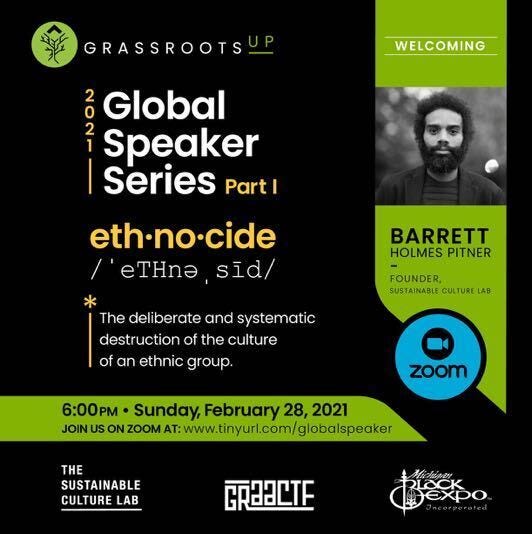Yaoyorozu no kami (八百万の神) • phrase • (yàóyó ròzù no kamee)
Definition: Eight Million Gods
Origin: Japanese
Pre-orders for Barrett Holmes Pitner’s book THE CRIME WITHOUT A NAME are now available. You can place those orders through your local independent bookseller, or any of the following: Bookshop.org | Amazon.com | Barnes and Noble
Today at 6pm EST, I am speaking at the Grassroots Up: Global Speakers Series. You can attend the zoom event by clicking the link, and you can learn more about the event at the end of the newsletter.
One of the first people to express much interest in my work was my good friend Brian. He had never heard of the word ethnocide before but immediately saw how this word could help him articulate the racism that he has experienced in America.
Because he is Asian American, many people would dismiss his personal encounters with racism. He was supposedly part of the “model minority” and therefore existed in a mythical plain of existence beyond the reach of American racism. The intergenerational scope of the racism inflicted upon Asian Americans was not the same as the racism directed towards Black and Indigenous Americans, so when he compared his experiences to other people of color, it was not taken as seriously.
He existed in a linguistic void where if he used the same terminology that Black Americans used to describe the racism he experienced as an Asian American, other people would attempt to dismiss or downplay the severity of the racism he suffered. He linguistically could not claim to have experienced the same iteration of racism that Black Americans have suffered, and there did not appear to be a discourse for expressing the specific iteration of racism inflicted upon Asian Americans.
The language of ethnocide helped give him the linguistic foundation for articulating the racism and cultural destruction that befalls Asian people in this country. Ethnocide impacts ALL Americans in various ways, and now he could express how ethnocide has impacted him.
As the incidents of abuse against Asian Americans have increased this past year, I have thought about the many Asian Americans who have strongly related to my work and supported it over the years. I’m honored that they believe my work can empower their voice in America, which leads me to this week’s phrase, “yaoyorozu no kami.”
We Are Surrounded By Gods
Yaoyorozu no kami is a Japanese phrase from the Shinto religion whose literal translation is “eight million gods,” but it also means much more than that. Yaoyorozu (八百万) means “eight million,” and in Japan, “eight million” signifies an infinitely large number (I suspect that this is because the number “8” resembles the infinity sign, “∞” when turned on its side, but I could also be wrong). It means that we exist in a world consisting of an infinite amount of gods.
Yaoyorozu no kami signifies that a god exists in all human beings and in every single thing that exists on the planet. This is a religious step beyond polytheism, where there are many gods, and monotheism, with only one god. Additionally, a belief in an infinite amount of gods does not preclude us from having polytheistic or monotheistic beliefs. A Christian can still believe in a Christian God while also believing that a valuable god or spirit resides in all things on earth.
As Asian Americans suffer growing amounts of racist abuse, we all need this Shinto phrase to remind us of the god or spirit that resides within all of us. American ethnocide has long aspired to destroy the spirit or Geist of the ethnocidee, so we must counter ethnocide by recognizing the spirit within all of us.
An ethnocidal society is ill-equipped at cultivating the language for appreciating and respecting the human spirit. To transcend this destructive language, we must bring the words and philosophies of various regions to our discourse in order to bring us back to our shared humanity. More often than not, the language we need originates from those whose culture and spirit are the very ones American ethnocide seeks to destroy.
The Practice of Interacting with Gods
I first learned about yaoyorozu no kami through the work of Marie Kondo.
I was fascinated by how she had turned the seemingly monotonous and boring activity of folding your clothes and organizing your possessions into a philosophical practice that could “spark joy.” Likewise, I was intrigued by how America needed to commodify her philosophy, extract its meaning, and turn it into a trend in order to appeal to American “consumers.”
Kondo’s philosophy derives from the practice of recognizing the god or spirit that resides within everything in your home, including inanimate objects. By recognizing each item’s spirit, you commit yourself to treating it with care. Everything has meaning and a spirit, and we are obligated to recognize and respect these infinite gods. Even the possessions you choose to give away deserve respect, and we need to thank these objects for the joy they once provided us.
Recognizing the gods that exist all around and within us is not a theoretical exercise. It is a philosophy that requires the cultivation of practices that can influence every aspect of our lives. It can influence how we fold our clothes, organize our home, treat other species and the environment, and treat other people.
There are infinite ways that we can manifest yaoyorozu no kami, and it behooves all of us to cultivate practices that empower us to recognize the infinite gods that reside within everything.
For this week, try envisioning that the objects in your room or your home each have a unique spirit residing in them. How would you treat your home or your belongings differently?
If you would like to share your thoughts and experiences with us, email us at theword@scl.community or share them on social media.
You can attend the event by clicking here.





